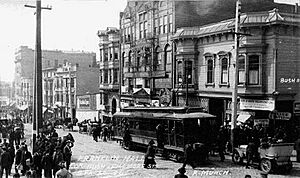Committee of Fifty (1906) facts for kids
After the big 1906 San Francisco earthquake hit, the city of San Francisco was in chaos. To help manage everything, the Mayor, Eugene Schmitz, created a special group called the Committee of Fifty. It was also known by other names like the Committee of Safety. The Mayor invited important people from the city to join. These included business leaders, newspaper owners, and politicians. They were chosen to help run San Francisco during this difficult time.
Even though there wasn't a specific law for it, Mayor Schmitz felt this group was needed to handle the emergency. They first met in the damaged Hall of Justice on the day of the earthquake, April 18th. But it quickly became unsafe! So, they moved across the street to the Plaza Hotel. Two hours later, they had to move again because of the fires. They ended up meeting in the ballroom of the Fairmont Hotel. Here, they started setting up smaller groups, called sub-committees, to tackle different problems.
The Fairmont Hotel burned down overnight. The next morning, April 19th, the Committee met at a police station. But the heat from the fires was too much, so they had to move again! They finally settled at Franklin Hall on Fillmore Street. This place became like a temporary city hall for the rest of the crisis. Many people joined the committee, even though they weren't officially invited. They all worked together to help the city recover.
Who Was in the Committee?
The Committee of Fifty got its name because a newspaper, The New York Times, first listed 49 members. But actually, many more people helped out! People came and went as they could during the emergency. The Mayor, Eugene Schmitz, was the main leader. Other important people included Rufus P. Jennings, who was the secretary, and I. Choynski, who helped share information with the public.
Many different kinds of people joined to help. There were lawyers, business owners, and even religious leaders like Rabbi Jacob Voorsanger and Archbishop George Thomas Montgomery. People from various jobs, like engineers, doctors, and even a woman who was a Certified Public Accountant (Myrtle E. Cerf), stepped up. Former mayors, like James D. Phelan, also became members. This shows how many people wanted to help San Francisco get back on its feet.
What Did the Sub-Committees Do?
The Committee of Fifty divided its big tasks into smaller jobs for different groups, called sub-committees. Each sub-committee focused on a specific problem caused by the earthquake and fires. Here are some of the important jobs they did:
- Helping People Get Food: This group, led by Rabbi Jacob Voorsanger, made sure hungry people got food.
- Finding Homes for People: Many people lost their homes. This group, led by W. J. Bartnett and Fairfax W. Wheelan, worked to find places for them to stay.
- Caring for the Sick and Hurt: Katharine Felton led the group that helped people who were injured or sick.
- Getting Medicine: Dr. Harris led the team that made sure there were enough drugs and medical supplies.
- Helping Chinese Residents: Rev. Filben's group focused on helping the Chinese community.
- Moving People Safely: Thomas Magee's team helped transport people who needed to leave dangerous areas.
- Keeping Order: There were groups for Citizens' Police and an Auxiliary Fire Department to help keep the city safe.
- Fixing City Services: Other groups worked on getting water, electricity, and telephones working again. They also helped restore transportation like streetcars.
- Getting Businesses Running: Some sub-committees focused on helping stores and businesses reopen.
- Managing Money: James D. Phelan led the finance group, which handled the money needed for relief efforts.
- Keeping Things Clean: A sanitation group worked to keep the city clean and prevent diseases.
- Relocating Chinese Residents: Abe Ruef led a group that tried to help Chinese residents find new places to live.
- Recording History: Frank S. Drum's group collected information to create a history of the event.
These sub-committees worked hard to bring order and help to San Francisco after the huge disaster.
Sources
- Gordon Thomas & Max Morgan Witts: The San Francisco Earthquake (New York: Stein and Day, 1971; London: Souvenir Press, 1971; reprinted Dell Paperback, 1972, SBN 440–07631)
 | Kyle Baker |
 | Joseph Yoakum |
 | Laura Wheeler Waring |
 | Henry Ossawa Tanner |


